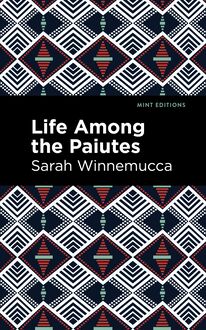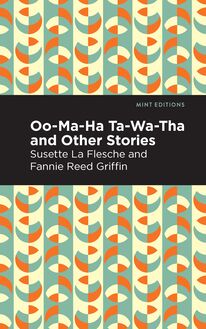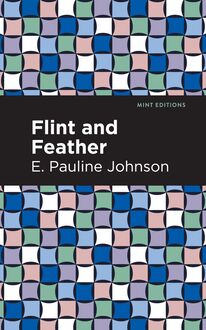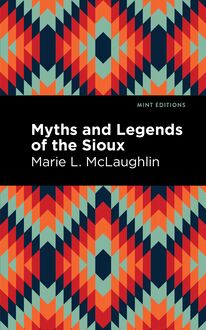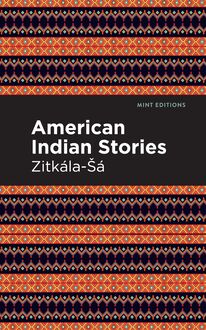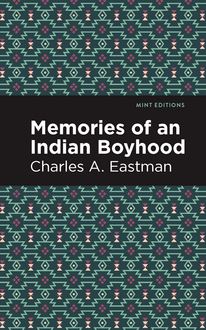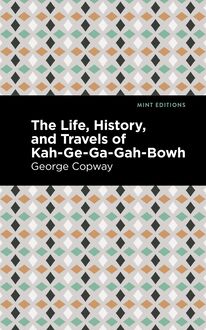-
 Univers
Univers
-
 Ebooks
Ebooks
-
 Livres audio
Livres audio
-
 Presse
Presse
-
 Podcasts
Podcasts
-
 BD
BD
-
 Documents
Documents
-
- Cours
- Révisions
- Ressources pédagogiques
- Sciences de l’éducation
- Manuels scolaires
- Langues
- Travaux de classe
- Annales de BEP
- Etudes supérieures
- Maternelle et primaire
- Fiches de lecture
- Orientation scolaire
- Méthodologie
- Corrigés de devoir
- Annales d’examens et concours
- Annales du bac
- Annales du brevet
- Rapports de stage
La lecture à portée de main
Vous pourrez modifier la taille du texte de cet ouvrage
Découvre YouScribe en t'inscrivant gratuitement
Je m'inscrisOo-Ma-Ha-Ta-Wa-Tha and Other Stories , livre ebook
Découvre YouScribe en t'inscrivant gratuitement
Je m'inscrisEn savoir plus
Vous pourrez modifier la taille du texte de cet ouvrage
En savoir plus

Description
Oo-Ma-Ha-Ta-Wa-Tah and Other Stories (1898) is a work of history and folklore by Fannie Reed Griffen and Susette La Flesche. Written at the end of a century of devastation, marked by the Western advance of American political, industrial, and military forces, Oo-Ma-Ha-Ta-Wa-Tah and Other Stories preserves as much as it can between the bindings of a book the traditions and stories of the Omaha people. “In remembrance of the Omahas, the tribe of Indians after which Omaha city is named, and who, less than fifty years ago, held an uncontested title to the land where Omaha city and the great Trans-Mississippi Exposition is located, this book is dedicated, that the memory of the tribe, its chieftains, its warriors and its maidens might be preserved.” Combining biography, historical documents, and folk tales, Oo-Ma-Ha-Ta-Wa-Tah and Other Stories serves as an invaluable record of a proud people. Beginning with the disastrous broken treaty of 1854, Griffen and La Flesche tell the tragic story of the Omahas through the lives of the chiefs who signed it. Concluding with a sampling of entertaining stories inherited from an oral tradition, Oo-Ma-Ha-Ta-Wa-Tah and Other Stories remains a masterpiece of fiction and nonfiction from two groundbreaking and vastly underappreciated figures in American history. With a beautifully designed cover and professionally typeset manuscript, this edition of Susette La Flesche and Fannie Reed Griffen’s Oo-Ma-Ha-Ta-Wa-Tah and Other Stories is a classic work of Native American literature reimagined for modern readers.
Sujets
Informations
| Publié par | Mint Editions |
| Date de parution | 23 avril 2021 |
| Nombre de lectures | 0 |
| EAN13 | 9781513288383 |
| Langue | English |
| Poids de l'ouvrage | 1 Mo |
Informations légales : prix de location à la page 0,0300€. Cette information est donnée uniquement à titre indicatif conformément à la législation en vigueur.
Extrait
Oo-Ma-Ha Ta-Wa-Tha and Other Stories
Susette La Flesche and Fannie Reed Griffin
Oo-Ma-Ha Ta-Wa-Tha and Other Stories was first published in 1898.
This edition published by Mint Editions 2021.
ISBN 9781513283364 | E-ISBN 9781513288383
Published by Mint Editions ®
minteditionbooks.com
Publishing Director: Jennifer Newens
Design & Production: Rachel Lopez Metzger
Project Manager: Micaela Clark
Typesetting: Westchester Publishing Services
“The translations of the stories are as literal as possible. To get an Indian to relate a tribe legend to a white man is not a small undertaking. Their legends are sacred matters with them.”
Through the kindness of Mr. Julius Meyer of Omaha, who has the largest and finest Indian relic collection in the west, and also of Henry Fontenelle and Louis Neil—two Omaha Indians—we obtained several photographs of chiefs which otherwise could not have been procured.
C ONTENTS P REFACE T REATY WITH THE I NDIANS S HON - GA - SKA , OR L OGAN F ONTENELLE E- STA - MAH - ZA , OR J OSEPH L A F LESCHE G RA - TAH - NAH - JE , OR S TANDING H AWK G AH - HE - GA - GIN - GAH , OR L ITTLE C HIEF T AH - WAH - GAH - HA , OR V ILLAGE M AKER W AH - NO - KE - GA , OR N OISE S O - DA - NAH - ZE , OR Y ELLOW S MOKE T O THE D RIVING C LOUD B IG E LK W A - JA - PA ’ S L ETTER A D REAM W OMAN L OUIS T HE C APTIVE ’ S S ONG I NDIAN P ICTURE W RITING I NDIAN F OLK L ORE S TORY O MAHA IN 1898 N EBRASKA T HE C UBAN M OTHER O UR B OYS IN C UBA
P REFACE
In remembrance of the Omahas, the tribe of Indians after which Omaha city is named, and who, less than fifty years ago, held an uncontested title to the land where Omaha city and the great Trans-Mississippi Exposition is located, this book is dedicated, that the memory of the tribe, its chieftains, its warriors and its maidens might be preserved. The book is edited by one who was herself born on Nebraska soil, and at whose father’s house the chiefs of several Nebraska tribes were always received with a welcome, and given hospitable entertainment.
Most of the illustrations are the productions and reproductions of the brush and pencil of the daughter of E-sta-mah-za (Iron Eye), noted chief of the Omahas, pronounced by the tribe, Oo-mah-ha. The book also contains a copy of the treaty with the Omahas by which instrument the title of the land upon which Omaha city and the Trans-Mississippi Exposition is located passed to the United States government in 1854. Reproductions of the photographs of all, except one, of the chiefs (Tah-wah-gah-ha, or Village Maker, feared the camera, therefore his picture was never taken) who signed the treaty, with a short character sketch of each. The illustrations by Inshta Theumba (Bright Eyes) are believed to be the first artistic work by an American Indian ever published; and the book will be entertaining on that account alone. It is hoped that a souvenir of this kind will not only recall the wonderful progress made by the white people who have found homes in the valley of the Mississippi, but create and forever perpetuate a kindly feeling for the remnant of the Indian people still remaining, and who are slowly struggling upward toward a higher civilization.
T REATY WITH THE I NDIANS
M arch, 16, 1854.
Franklin Pierce, President of the United States of America, to all and singular to whom these presents shall come, Greeting:
Whereas a Treaty was made and concluded at the City of Washington, on the sixteenth day of March, one thousand eight hundred and fifty-four, by George W. Manypenny, Commissioner on the part of the United States, and the Omaha tribe of Indians, which treaty is in the words following, to wit:
Articles of agreement and convention made and concluded at the City of Washington this sixteenth day of March, one thousand eight hundred and fifty-four, by George W. Manypenny, as Commissioner on the part of the United States, and the following named chiefs of the Omaha tribe of Indians, viz: Shon-ga-ska, or Logan Fontenelle; E-sta-mah-za, or Joseph Le Flesche; Gra-tah-nah-je, or Standing Hawk; Gah-he-ga-gin-gah, or Little Chief; Tah-wah-gah-ha, or Village Maker; Wah-no-ke-ga, or Noise; So-da-nah-ze, or Yellow Smoke; they being thereto duly authorized by said tribe.
A RTICLE 1. The Omaha Indians cede to the United States all their lands west of the Missouri river, and south of a line drawn due west from a point in the center of the main channel of said Missouri river due east of where the Ayoway river disembogues out of the bluffs, to the western boundary of the Omaha country, and forever relinquish all right and title to the country south of said line. Provided, however, that if the country north of the said due west line, which is reserved by the Omahas for their future home, should not on exploration prove to be a satisfactory and suitable location for said Indians, the President may, with the consent of said Indians, set apart and assign to them, within or outside of the ceded country, a residence suited for and acceptable to them. And for the purpose of determining at once and definitely, it is agreed that a delegation of said Indians, in company with their agent, shall, immediately after the ratification of this instrument, proceed to examine the country hereby reserved, and if it please the delegation, and the Indians in counsel express themselves satisfied, then it shall be deemed and taken for their future home; but if otherwise, on the fact being reported to the President, he is authorized to cause a new location, of suitable extent, to be made for the future home of said Indians, and which shall not be more in extent than three hundred thousand acres, and then in that case, all the country belonging to the said Indians north of a said due west line, shall be and is hereby ceded to the United States by the said Indians, they to receive the same rate per acre for it, less the number of acres assigned in lieu of it for a home, as now paid for the land south of said line.
A RTICLE 2. The Omahas agree, that so soon after the United States shall make the necessary provision for fulfilling the stipulations of this instrument, as they can conveniently arrange their affairs, and not to exceed one year from its ratification, they will vacate the ceded country, and remove to the lands reserved herein by them, or to the other lands provided for in lieu thereof, in the preceding article, as the case may be.
A RTICLE 3. The Omahas relinquish to the United States all claims, for money or other thing, under former treaties, and likewise all claim which they may have heretofore, at any time, set up, to any land on the east side of the Missouri river: Provided, The Omahas shall still be entitled to and receive from the Government, the unpaid balance of the twenty-five thousand dollars appropriated for their use, by the act of thirtieth of August, 1851.
A RTICLE 4. In consideration of and payment for the country herein ceded, and the relinquishments herein made, the United States agree to pay to the Omaha Indians the several sums of money following, to wit:
1st. Forty thousand dollars per annum, for the term of three years, commencing on the first day of January, eighteen hundred and fifty-five.
2nd. Thirty thousand dollars per annum, for the term of ten years, next succeeding the three years.
3rd. Twenty thousand dollars per annum, for the term of fifteen years, next succeeding the ten years.
4th. Ten thousand dollars per annum, for the term of twelve years, next succeeding the fifteen years.
All which several sums of money shall be paid to the Omahas, or expended for their use and benefit, under the direction of the President of the United States, who may from time to time determine, at his discretion, what proportion of the annual payments, in this article provided for, if any, shall be paid to them in money, and what proportion shall be applied to and expended for their moral improvement and education; for such beneficial objects as in his judgment will be calculated to advance them in civilization; for buildings, opening farms, fencing, breaking land, providing stock, agricultural implements, seeds, etc.; for clothing, provisions, and merchandise; for iron, steel, arms and ammunition; for mechanics, and tools; and for medical purposes.
A RTICLE 5. In order to enable the said Indians to settle their affairs and to remove and subsist themselves for one year at their new home, and which they agree to do without further expense to the United States, and also to pay the expenses of the delegation who may be appointed to make the exploration provided for in article first, and to fence and break up two hundred acres of land at their new home, they shall receive from the United States, the further sum of forty-one thousand dollars, to be paid out and expended under the directions of the President, and in such manner as he shall approve.
A RTICLE 6. The President may, from time to time, at his discretion, cause the whole or such portion of the land hereby reserved, as he may think proper, or of such other land as may be selected in lieu thereof, as provided for in article first, to be surveyed into lots, and to assign to such Indian or Indians of said tribe as are willing to avail of the privilege, and who will locate on the same as a permanent home, if a single person over twenty-one years of age, one eighth of a section; to each family of two, one quarter section; to each family of three and not exceeding five, one-half section; to each family of six and not exceeding ten, one section; and to each family over ten in number, one-quarter section for every additional five members. And he may prescribe such
-
 Univers
Univers
-
 Ebooks
Ebooks
-
 Livres audio
Livres audio
-
 Presse
Presse
-
 Podcasts
Podcasts
-
 BD
BD
-
 Documents
Documents
-
Jeunesse
-
Littérature
-
Ressources professionnelles
-
Santé et bien-être
-
Savoirs
-
Education
-
Loisirs et hobbies
-
Art, musique et cinéma
-
Actualité et débat de société
-
Jeunesse
-
Littérature
-
Ressources professionnelles
-
Santé et bien-être
-
Savoirs
-
Education
-
Loisirs et hobbies
-
Art, musique et cinéma
-
Actualité et débat de société
-
Actualités
-
Lifestyle
-
Presse jeunesse
-
Presse professionnelle
-
Pratique
-
Presse sportive
-
Presse internationale
-
Culture & Médias
-
Action et Aventures
-
Science-fiction et Fantasy
-
Société
-
Jeunesse
-
Littérature
-
Ressources professionnelles
-
Santé et bien-être
-
Savoirs
-
Education
-
Loisirs et hobbies
-
Art, musique et cinéma
-
Actualité et débat de société
- Cours
- Révisions
- Ressources pédagogiques
- Sciences de l’éducation
- Manuels scolaires
- Langues
- Travaux de classe
- Annales de BEP
- Etudes supérieures
- Maternelle et primaire
- Fiches de lecture
- Orientation scolaire
- Méthodologie
- Corrigés de devoir
- Annales d’examens et concours
- Annales du bac
- Annales du brevet
- Rapports de stage
